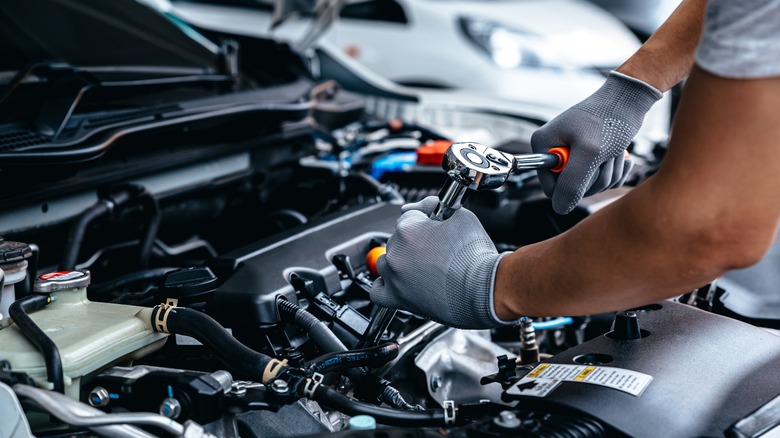Horsepower Vs. Torque Explained: What's The Difference?
When it comes to engine (and really, overall vehicle) power, the most commonly referenced values are horsepower and torque. Mainly horsepower, which some enthusiasts are always looking for ways to improve.
So which is better, horsepower or torque? It's not an easy question to answer as you can't really have one without the other — in particular, horsepower is partially determined by torque. Each one is a different kind of measurement of force as it applies to a given vehicle, and each one will impact a different aspect of the driving experience.
Both are significant when it comes to performance, and in general, bigger numbers are better. You probably want to avoid low values for both. Though depending on what you hope to get out of a vehicle, torque may actually be the more important metric of the two. It really comes down to intended use and expectations, which only you can decide.
What is horsepower?
Horsepower is typically the more commonly referenced metric when looking up the details on a vehicle (and by extension, the engine). The history behind this unit of measurement is a bit technical, but basically it boils down to one horsepower producing approximately 33,000 foot pounds of "work" every minute.
The horsepower output of modern vehicles is typically determined with a dynamometer, which is sort of like a big treadmill that allows the wheels to spin while speed and weight are measured. Then the dynamometer runs some calculations to determine both horsepower and torque values.
Essentially, horsepower is a measurement of how long it takes a vehicle to produce the amount of force (torque) it's capable of. Which is a fancy way of saying higher horsepower generally means a higher overall top speed — though heavier vehicles will require more horsepower to reach the same speeds as one that weighs less, so it's not the only metric you'll need to look at if you want something fast.
And what's torque?
Torque is conceptually a bit simpler than horsepower in that it's basically just the measurement of how much force a vehicle can produce — while horsepower measures the speed at which that force is produced. More specifically, torque is a measurement of how much force is applied to the drive shaft and is measured in either newton-meters (Nm) or pound-feet (lb-ft).
As explained by BMW, vehicles benefit most from high torque at lower speeds, but it's also ideal to spread that torque (force) across as much of an engine's speed range as possible. That way the force being produced is available more consistently, even at higher speeds and gears.
The production of force at low speeds is what determines a vehicle's acceleration rate, allowing a driver to get up to speed more quickly (or slowly) depending on capability. It's also what allows vehicles to more effectively maintain speed — or even accelerate — when driving uphill or when towing things like trailers or machinery.
When to look at the numbers
Both horsepower and torque are important factors to consider when looking at a vehicle's performance and can make a noticeable difference when driving. However, which is the more important of the two really depends on what you want to get out of it.
If you prefer something that can go really fast, high horsepower and low weight is what you should be looking for. Reasonably high torque is also good because it will help you speed up more quickly, but it won't really improve your top speeds.
Conversely, torque should be the bigger focus if you intend to do a lot of towing or possibly if you live in a mountainous region with a lot of uphill driving. You'll also want to note the vehicle's weight rating and towing capacity (both of which can be found either on the manufacturer's website or in the owner's manual) if you expect to pull any heavy stuff around.



